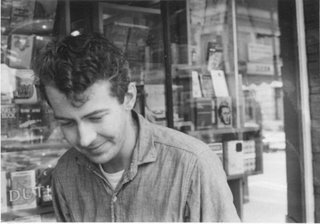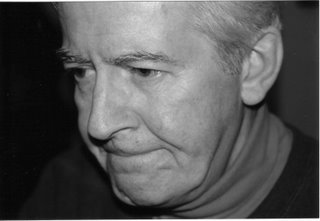
Three poems:
The Double-Headed Snake
Ride Off Any Horizon
Driving
This piece is about 7 printed pages long.
It is copyright © John Newlove and Jacket magazine 2007.
You can read Jeff Derksen’s article “These Things Form Poems When I Allow It”:
After John Newlove,in this issue of Jacket.
The Double-Headed Snake
Not to lose the feel of the mountains
while still retaining the prairies
is a difficult thing. What’s lovely
is whatever makes the adrenalin run;
therefore I count terror and fear among
the greatest beauty. The greatest
beauty is to be alive, forgetting nothing,
although remembrance hurts
like a foolish act, is a foolish act.
Beauty’s whatever
makes the adrenalin run. Fear
in the mountains at night-time’s
not tenuous, it is not the cold
that makes me shiver, civilized man,
white, I remember
the stories of the Indians,
Sis-i-utl, the double-headed snake.
Beauty’s what makes
the adrenalin run. Fear at night
on the level plains, with no horizon
and the stars too bright, wind bitter
even in June, in winter
the snow harsh and blowing,
is what makes me
shiver, not the cold air alone.
And one beauty cancels another. The plains
seem secure and comfortable
at Crow’s Nest Pass; in Saskatchewan
the mountains are comforting
to think of; among
the eastwardly diminishing hills
both the flatland and the ridge
seem easy to endure.
As one beauty
cancels another, remembrance
is a foolish act, a double-headed snake
striking in both directions, but I
remember plains and mountains, places
I come from, places I adhere and live in.
Ride Off Any Horizon
Ride off any horizon
and let the measure fall
where it may–
on the hot wheat,
on the dark yellow fields
of wild mustard, the fields
of bad farmers, on the river,
on the dirty river full
of boys and on the throbbing
powerhouse and the low dam
of cheap cement and rocks
boiling with white water,
and on the cows and their powerful
bulls, the heavy tracks
filling with liquid at the edge
of the narrow prairie
river running steadily away.
*
Ride off any horizon
and let the measure fall
where it may–
among the piles of bones
that dot the prairie
in vision and history
(the buffalo and deer,
dead indians, dead settlers,
the frames of lost houses
left behind in the dust
of the depression,
dry and profound, that
will come again in the land
and in the spirit, the land
shifting and the minds
blown dry and empty–
I have not seen it! except
in pictures and talk–
but there is the fence
covered in dust, laden,
the wrecked house stupidly empty)–
here is a picture for your wallet,
of the beaten farmer and his wife
leaning toward each other–
sadly smiling, and emptied of desire.
*
Ride off any horizon
and let the measure fall
where it may–
off the edge
of the black prairie
as you thought you could fall,
a boy at sunset
not watching the sun
set but watching the black earth,
never-ending they said in school,
round: but you saw it ending,
finished, definite, precise–
visible only miles away.
*
Ride off any horizon
and let the measure fall
where it may–
on a hot night the town
is in the streets–
the boys and girls
are practising against
each other, the men
talk and eye the girls–
the women talk and
eye each other, the indians
play pool: eye on the ball.
*
Ride off any horizon
and let the measure fall
where it may–
and damn the troops, the horsemen
are wheeling in the sunshine,
the cree, practising
for their deaths: mr poundmaker,
gentle sweet mr big bear,
it is not unfortunately
quite enough to be innocent,
it is not enough merely
not to offend–
at times to be born
is enough, to be
in the way is too much–
some colonel otter, some
major-general middleton will
get you, you–
indian. It is no good to say,
I would rather die
at once than be in that place–
though you love that land more,
you will go where they take you.
*
Ride off any horizon
and let the measure fall–
where it may;
it doesn’t have to be
the prairie. It could be
the cold soul of the cities
blown empty by commerce
and desiring commerce
to fill up the emptiness.
The streets are full of people.
It is night, the lights
are on; the wind
blows as far as it may. The streets
are dark and full of people.
Their eyes are fixed as far as
they can see beyond each other–
to the concrete horizon, definite,
tall against the mountains,
stopping vision visibly.
Driving
You never say anything in your letters. You say,
I drove all night long through the snow
in someone else’s car
and the heater wouldn’t work and I nearly froze.
But I know that. I live in this country too.
I know how beautiful it is at night
with the white snow banked in the moonlight.
Around black trees and tangled bushes,
how lonely and lovely that driving is,
how deadly. You become the country.
You are by yourself in that channel of snow
and pines and pines,
whether the pines and snow flow backwards smoothly,
whether you drive or you stop or you walk or you sit.
This land waits. It watches. How beautifully desolate
our country is, out of the snug cities,
and how it fits a human. You say you drove.
It doesn’t matter to me.
All I can see is the silent cold car gliding,
walled in, your face smooth, your mind empty,
cold foot on the pedal, cold hands on the wheel.

John Newlove, when young

John Newlove
These poems are included in a last collection of poems; A Long Continual Argument: The Selected Poems of John Newlove by John Newlove, who died in 2005. It is edited by Robert McTavish with an afterword by Jeff Derksen and is forthcoming in October 2007 from Chaudiere Books at http://chaudierebooks.blogspot.com/.
The Internet address of this page is http://jacketmagazine.com/34/newlove-3.shtml